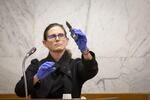The Big Picture
The prosecution continued its case against Jeremy Christian Wednesday morning. Christian is accused of killing two people and injuring a third in a stabbing attack on a Portland MAX light rail train in May 2017.
Last week, witnesses said Christian was shouting racist comments while two black teenage girls — Walia Mohamed and Destinee Mangum — were nearby on the train. Mohamed is Muslim and was wearing a hijab.
Christian is also accused of harassing and assaulting Demetria Hester, an African American woman, on a MAX train the day prior.
He faces a dozen felony and misdemeanor charges, including multiple counts of first-degree murder and intimidation.
The Highlights (What Happened Wednesday)
Continuing its case against Christian, the prosecution called Portland Police Bureau detective Michele Michaels to the stand Tuesday afternoon. Her testimony continued Wednesday morning.
She showed various pieces of evidence to the jury and court, including Christian’s knife.
Michaels said she interviewed Micah Fletcher, the survivor of the stabbings, while he was in the hospital. She said she also spoke with Christian at around 11 p.m. the same night of the attack, when he was in a holding cell at the Justice Center.

Portland police detective Michele Michaels displays evidence, including the belongings that were on Jeremy Christian when he stabbed three people on a MAX train in May 2017, during day six, February 4, 2020, of testimony in the trial.
Brooke Herbert / The Oregonian/OregonLive/Pool
Michaels asked Christian directly about his actions on the train. She read from a transcript for the court.
“I said, ‘How did everything happen?’” Michaels said.
“Mr. Christian said, ‘I can’t explain. There’s no way I can explain what happened,’” she said Christian told her. “‘Both of those people would’ve been alive if they would’ve kept their hands to themselves, got off the train or let me have my free speech.’”
She said Christian continued: “‘They signed their own death warrant and I don’t feel one bit remorseful or sorry about that.’”
Michaels also testified that Christian talked to her about his interactions with Demetria Hester on the night before the stabbings.
In her testimony last week, Hester said Christian was also ranting at her on a MAX train. She said he was yelling at her and threatening her. She sprayed him with mace as they exited the train and Christian threw a Gatorade bottle, half full with wine, at her eye.
Michaels interviewed Christian in his holding cell, in a video shown to the court and jury. Christian said something about people “putting hands on him.”
“She didn’t put her hands on you,” Michaels said of Hester to Christian.
“Well, I didn’t stab her did I?” Christian replied.”If the fucking fare enforcer wasn’t around I would’ve stabbed her.”
Chief deputy district attorney Don Rees asked Michaels how Christian appeared to be functioning mentally when responding to her questions in the holding cell.
Rees asked Michaels specifically if Christian had any difficulty tracking the conversation. “No,” she responded.
“Did he complain of any mental illness?” Rees asked. “No,” Michaels said.
Michaels also guided the courtroom through still photos taken on the MAX train during the stabbings, from security cameras and passengers’ cell phones.
One thing she noted in viewing frames of Taliesin Namkai-Meche, one of the deceased victims in the attack, was that during the entirety of stabbing, Namkai-Meche held onto his cellphone in one hand and a container of food in the other.

Portland police detective Michele Michaels displays evidential photos to the jury during day seven, February 5, 2020, of testimony in the trial of Jeremy Christian for the stabbing of three people on a MAX train in May 2017.
Brooke Herbert / The Oregonian/OregonLive/Pool
“It indicated to me that Mr. Taliesin Namkai-Meche never did anything to defend himself,” Michaels said. “There wasn’t anything that he did to try to rectify the situation for himself. He was defenseless.”
In some of the frames, Ricky Best, the second deceased victim, is shown standing behind Namkai-Meche, with his right hand on one of the train’s stability bars and his left hand by his side. In one frame, Christian appears to grab Best, pulling him towards the stabbing.
Michaels’ testimony confirmed that Christian was the first person to make physical contact — first knocking Namkai-Meche’s phone out of his hand, then later shoving Micah Fletcher, the survivor of the attack, and then shoving Namkai-Meche.
“What I’m noting on all of this is no one has touched [Christian] at this point, yet he’s pushed Micah Fletcher and pushed Taliesin Namkai-Meche all while getting his knife out of his pocket,” Michaels said.
During Michaels’ testimony, Christian shook his head in disagreement. Rees, with the prosecution, interrupted Michaels briefly to call Christian’s actions to the attention of the judge.
“We just watched the video and she’s lying,” Christian said of Michaels. “It’s clear.”
The judge ordered Christian to stay quiet.
In his cross examination of Michaels, one of Christian’s defense attorneys, Dean Smith, walked through some inconsistencies in witness statements Michaels had taken.
“The details that people relayed to you varied, is that correct?” Smith asked Michaels.
“Sometimes they did,” she replied.
Smith said one witness said Christian had been wearing a hat, another witness said Christian had slammed Shawn Forde, a passenger, into the MAX train while he exited. Neither of those things were true, according to videos from the train.
Michaels explained that she recommended witnesses not watch any videos, talk with other witnesses or view any media coverage before their interviews as to keep a “pure recollection.”
She said each person’s perceptions of what happened are different.
Rees, with the prosecution, redirected the conversation.
“Did you encounter anyone who did not express to you that they were traumatized by what happened?” Rees asked Michaels.
“No, sir,” she replied.
Defense attorney Smith had also asked Michaels about her timeline of the events, where Michaels had noted that Christian appeared to be focusing on the two black teenagers, Mohamed and Mangum, for 31 seconds.
“Is 31 seconds long enough to intimidate another person?” Rees asked.
“Yes, sir,” Michaels said.
The prosecution also called Steven Ober, an investigator for the Multnomah County District Attorney’s office.
Ober reviewed a jail phone call that took place between Christian and a woman in January 2018, and jurors heard portions of it Wednesday.
In the phone call, Christian specifically talked about Fletcher being diagnosed on the autism spectrum and subsequently Fletcher’s history of being bullied growing up.
“Apparently that rubbed off on him,” Christian told the woman on the other end,” because he decided to bully me on the MAX train, and that didn’t work out well for him.”
On the call, Christian described his interactions with Fletcher on the train “an autistic tantrum thrown by another wannabe social justice warrior.”
Christian also talked about Namkai-Meche and his aunt Beatrix Therese VanOlphen, who Namkai-Meche was talking to on the phone on the train before the stabbings. VanOlphen testified last week that she heard Christian’s ranting on her end of the phone and had suggested that Namkai-Meche take a video of what was happening.
“Basically his aunt sent him to his death,” Christian said.
What Happens Next
The prosecution has finished its “case in chief,” meaning it has no further witnesses to call or exhibits to present. The defense will begin its case Monday. The trial itself is expected to last through the end of February.
Go Deeper
- Powerful Evidence Raises Questions About Legal Approaches To MAX Murder Trial
- Survivor Of Portland TriMet Stabbing Testifies In Ongoing Murder Trial
- Communities Of Color Still Reeling From 2017 Portland MAX Attack
